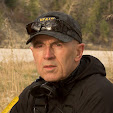
My Little Red House
I was in the Drumheller Valley lately shooting photos throughout the badlands, when I struck up a conversation with a young photographer who commented that he wished he had cameras like mine, so that he could improve his photo shooting skills. That got me to thinking about a time when I had those same thoughts and put more effort in to worrying about the camera that I did not have but wished I had, thinking that this was what I needed to be a better photographer. All these years later, I have learnt that It's the photographer that takes great photos, not the camera. Think about that for a moment. It's true isn't it? I've seen great photos taken with a simple digital point & shoot, while some photographers take lousy shots with the most expensive DSLR.
That got me to thinking about a time when I had those same thoughts and put more effort in to worrying about the camera that I did not have but wished I had, thinking that this was what I needed to be a better photographer. All these years later, I have learnt that It's the photographer that takes great photos, not the camera. Think about that for a moment. It's true isn't it? I've seen great photos taken with a simple digital point & shoot, while some photographers take lousy shots with the most expensive DSLR. I thought about what advice that I could give to new photographers based on lessons that I have learnt over the years. First, get to know your camera. Don't come home with your new camera, rip open the box, and briefly look at the manual and never look at it again. Instead, learn everything that you can about your new camera, how to control exposure, the different modes, and how to use the flash properly. What you learn about your camera, will pay dividends when your out shooting photos. The other thing you want to learn, is to hold your camera level.
I thought about what advice that I could give to new photographers based on lessons that I have learnt over the years. First, get to know your camera. Don't come home with your new camera, rip open the box, and briefly look at the manual and never look at it again. Instead, learn everything that you can about your new camera, how to control exposure, the different modes, and how to use the flash properly. What you learn about your camera, will pay dividends when your out shooting photos. The other thing you want to learn, is to hold your camera level.  Since most digital cameras come with a LCD, you can use it to properly frame your shots. Next time you're taking a shot, try to look for the horizontal lines and use them as guides. A good example is to make use of the horizon when you're taking a photo of a sunset. Of course you can use a photo editing program on your computer to fix problems such as these, however get in the habit of proper composure while shooting the photograph, as this will result in less time sitting in front of your computer. Next, I cannot stress enough the use of a tripod to support your camera, as this is an essential tool in your photography arsenal.
Since most digital cameras come with a LCD, you can use it to properly frame your shots. Next time you're taking a shot, try to look for the horizontal lines and use them as guides. A good example is to make use of the horizon when you're taking a photo of a sunset. Of course you can use a photo editing program on your computer to fix problems such as these, however get in the habit of proper composure while shooting the photograph, as this will result in less time sitting in front of your computer. Next, I cannot stress enough the use of a tripod to support your camera, as this is an essential tool in your photography arsenal.  When will you need a tripod? It's useful under most conditions, including if you're taking shots under low-light conditions, or trying to capture fast moving objects. I always use a tripod for all my photographs, as there is nothing that annoys me more than getting home and upon examination of my photographs that I have just uploaded to my computer, to find that what should be one of my best captures of the day, is headed to the trash bin, because I was lazy and did not use a tripod. Always try to look for a tripod that's convenient to carry around. For personal use, you don't need a huge one - just a simple compact one that's easy to pack. There are more hints that I can share with you for shooting great photos, but that will have to wait till next time. For now, get out and use that camera. See you in the field.
When will you need a tripod? It's useful under most conditions, including if you're taking shots under low-light conditions, or trying to capture fast moving objects. I always use a tripod for all my photographs, as there is nothing that annoys me more than getting home and upon examination of my photographs that I have just uploaded to my computer, to find that what should be one of my best captures of the day, is headed to the trash bin, because I was lazy and did not use a tripod. Always try to look for a tripod that's convenient to carry around. For personal use, you don't need a huge one - just a simple compact one that's easy to pack. There are more hints that I can share with you for shooting great photos, but that will have to wait till next time. For now, get out and use that camera. See you in the field.






















No comments yet